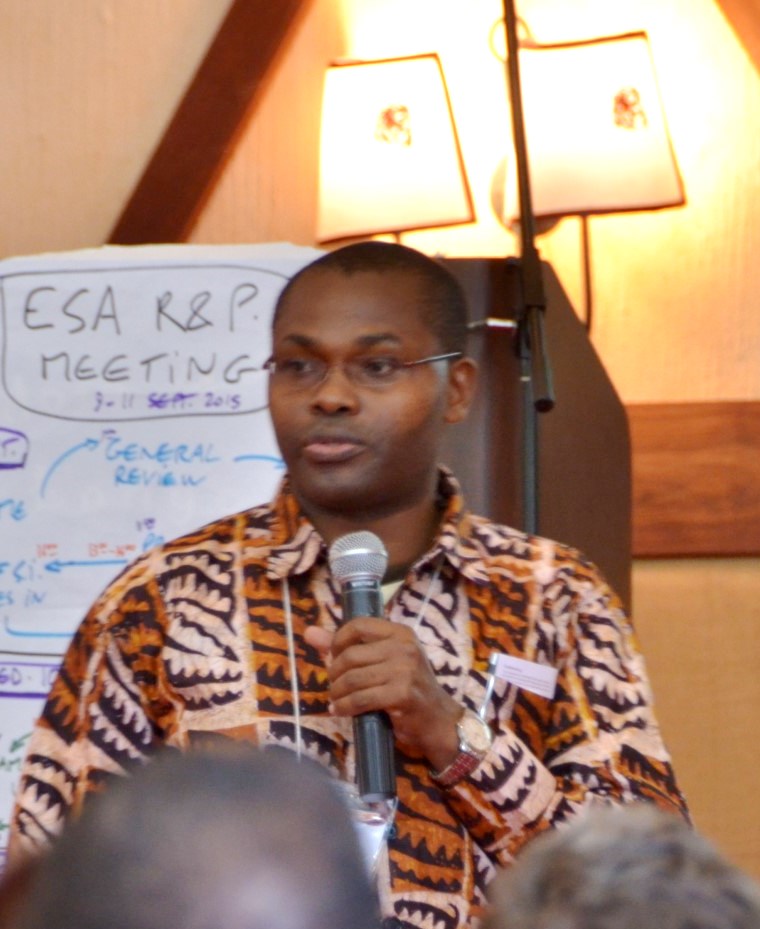RISING voices: Anthony Kimaro, scientist and ICRAF Tanzania country representative

Anthony Kimaro is from Same, Tanzania. He studied forestry at Bachelors and Masters levels at Sokoine University in Morogoro, Tanzania and a PhD in forestry from the University of Toronto, Canada. Throughout his studies, he specialized in agroforestry, focusing on soil fertility management, tree-crop interactions and woodlot management.
Before joining Africa RISING, he was community-based forestry management officer with Wildlife Conservation Society in Tanzania, from January-April 2000, under the Uluguru Mountain Biodiversity Conservation project. His responsibility was to conduct awareness on environmental and forestry conservation issues and training the community including farmers and school children on tree planting and nursery techniques. This was to encourage them to plant trees at home or on farm to reduce pressure on native forests.
Thereafter, Kimaro worked as lecturer of plant ecology and botany at the Faculty of Science at Sokoine University from May 2000-2009 before becoming assistant professor of agroforestry and soils, department of soil science at the University of Saskatchewan, Canada from 2009-2011. Currently, he is a scientist as well as country representative for the World Agroforestry Centre (ICRAF) in Tanzania and adjunct professor of agroforestry and soils, University of Saskatchewan. Despite responsibilities in the three positions, he is still able to keep his research focus and link with universities within and outside Tanzania via co-supervision of graduate students, research projects and proposal writing.
With Africa RISING, Kimaro leads two work package (WP) teams, WP 2 on evaluation of soil fertility and water management options and WP 3 on enhancing livestock and poultry productivity in Kongwa and Kiteto districts. He has been with Africa RISING since May 2012 when he headed the ICRAF-led Jumpstart project.
1. Can you give us a brief overview of what you do in your current position? I manage all research activities and partners related to WP 2 and 3 where we are testing various land water management and tree-based technologies on selected farms. I also co-supervise three graduate students attached to these work packages. I work very closely with all members of our team to ensure that activities are implemented as agreed and we develop annual plans within the guidelines provided by the Africa Rising research program document.
2. What would you say most motivates you to do what you do? My motivation is too see that we generate research results that will transform people lives and add value to science.
3. What do you think is unique about Africa RISING? It is a research program that challenges researchers and partners to think outside the box, to do things differently in their discipline and to design system-based research which will benefit farmers and scientists.
4. What are the goals you most want to accomplish in your work? We are testing and validating various land water management and tree-based technologies on selected farms. My goal is to see that these technologies reach as many farmers as possible through scaling up activities being developed this year. This can be achieved through forming and strengthening partnerships between Africa RISING and other United States Agency for International Development (USAID)-funded projects in Tanzania like the Tanzania Staples Value Chain project (NAFAKA) and Tuboreshe Chaluka project which are working with many farmers already.
5. What do you think is most challenging part of working in Africa RISING? Initially bringing all partners on board to deliver within tight annual action plans of Africa RISING was a big challenge to me. However, with time we have learnt to appreciate the strength and weakness of each other and identified areas where we can complement each other to keep pace with the demand and excitement of working in a mega program like Africa RISING. Also communications within the Africa RISING program has been a challenge because sometimes information takes time to reach implementers or decision-makers.
6. And how do you think you contribute to address these challenges? I value and appreciate the contribution of others in the Africa RISING program without shying away from discussing differences of opinions that may be of beneficial to the programme. I do my best to keep all my team members and supervisors informed and take a proactive approach to follow up issues or reminding them.
7. What are the lessons you have learned so far? Engaging farmers in learning-by-doing activities motivates them to support the project by taking up technologies to validate them on their farms.




